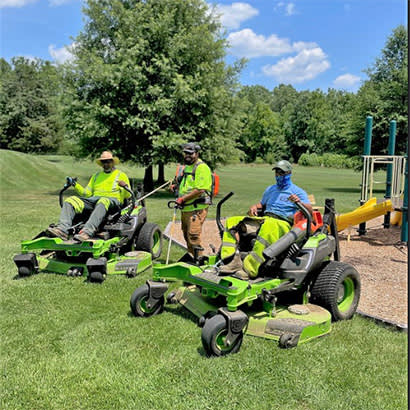
For an enhanced digital experience, read this story in the ezine.
Five years ago, Montgomery Parks (Maryland) Deputy Director of Operations Gary Burnett had a vision for Montgomery Parks: replace noisy gas-powered landscaping equipment with the quiet hum of electric tools in public parks. This would reduce noise pollution and harmful emissions to the environment and to staff, who use the equipment regularly to maintain parks.
Planning the “E-volution”
Montgomery Parks is a department of the Maryland-National Capital Park and Planning Commission, a bi-county agency in Washington, D.C., that stewards 37,000 acres of parkland in Montgomery County.
Staff were using hundreds of pieces of gas-powered equipment daily, so the first phase of the conversion to electric focused on smaller two-cycle engines that power string trimmers, leaf blowers and edgers.
“Two-cycle engines are very detrimental because they emit oil directly into the air. I was committed to finding a better way to take care of our parks, communities and staff,” says Burnett.
Gas-powered equipment also requires frequent repairs and maintenance. In contrast, battery-powered tools require minimal maintenance and break down infrequently.
Approximately 300 tools were targeted for replacement by the end of 2024. The battery-powered gear costs more, but the switch was expected to pay for itself within one year. The savings come from reduced crew downtime due to maintenance delays and fewer spare units needing to be purchased to back up broken equipment.
By 2020, one year after Burnett’s idea, the electric conversion was underway. Every time a gas-powered tool died, it would be replaced with a battery-powered version. However, replacement through attrition was not going as quickly as planned, so Montgomery Parks broadened the mission to the whole department and secured a budget to pay for it. The new goal, which was met in 2023, was to replace all 700 tools.
Engaging Staff
Some staff had concerns about the switch, unsure if electric equipment would prove as powerful as the gas-powered versions and whether it might potentially require more time to complete their work. A committee was formed to research the equipment options and vendors were brought in to demonstrate equipment to those who would be using it.
“I explained the benefits of the new equipment and after they were able to get the string trimmers in their hands, they were happy with the results,” says Meadowbrook Park Senior Manager David Fisher.
Learning on the Job
Trial and error guided the conversion. At first, Montgomery Parks purchased various brands of equipment, always searching for the lowest price. However, in time, sticking with one brand proved more efficient, because batteries from the same maker are interchangeable.
Charging technology also is evolving. Initially, electricians outfitted storage rooms with rows of shelves and hundreds of outlets, resulting in a jumble of gear that may or may not get plugged in at the end of the day. Eventually, the charging rooms were replaced by trailers outfitted with tools and outlets for a five-person crew. Every day, each crew hauls the trailer to the work site, uses the tools, then plugs them into the trailer outlets when finished. The entire trailer is plugged into a 220-volt outlet back at the maintenance yard at the end of the day.
Ahead of the Curve
Montgomery Parks’ electric conversion of smaller equipment is complete, a year ahead of schedule.
“When we first started, most electric offerings were aimed at ‘Harry Homeowner,’” says Todd Holmes, southern regional operations manager at Montgomery Parks. “Because this was a multi-year transition, we have been experimenting while the industry made significant strides in technology. And where technology is lacking we found alternatives, like blower attachments or ride-on blowers, to get the work done.”
The Evolution Continues
The green revolution continues at Montgomery Parks with the expansion of its electric vehicle fleet. The department has 30 hybrid or fully electric vehicles on the road and is gradually acquiring more.
Next up to be replaced are heavy equipment, like zero-turn mowers, backhoes and loaders, all of which are available fully electric. The big equipment carries a big price tag, often tens of thousands of dollars more than traditional machinery.
Burnett says the investment is critical for the future. “This switch reduces carbon emissions and noise pollution, which improves the safety of our park operations staff and also supports our mission of environmental stewardship.”
Christina Hudson is Public Relations and Outreach Specialist at Montgomery Parks

